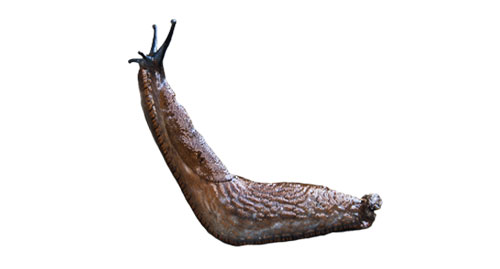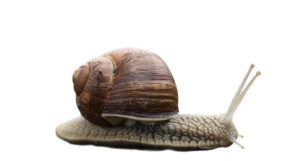Snails
The Pacific Northwest’s temperate moist climate and frequent overcast days make it a slug and snail paradise. Slugs and snails are mollusks, relatives of octopuses and mussels, not insects. Moisture is the key to slug and snail survival. They avoid the sun, spending daylight hours hiding in cool, damp places such as under mulches, low-lying plants, boards, and in the soil. Certain ground covers provide shady moist havens during the day. Ivy and other succulent groundcovers are favorite snail hangouts. Slugs and snails are common inhabitants around most homes and can be serious pests of landscape plantings. Some people may not be aware of the extent these mollusks can damage gardens because they are nocturnal. Although these garden pests look small, snails and slugs are voracious feeders and can cause extensive damage to landscaping.

General Information
Both slugs and snails love the moisture of the Pacific Northwest region.
Both are part of the mollusk phylum and are very similar in appearance. The main difference between the two is that snails have an external spiral shell, and slugs do not. Both species move by gliding on what can be described as a muscular foot. The muscle secretes a slimy mucous that helps them to move smoothly across the ground and along plants as they travel.
Slugs and snails feed on living and decomposing plant material, but they prefer young, tender plant growth. Newly sprouted seedlings and soft growth on established plants are often the first targets. Lettuces and tender herbs, such as basil, are also favored, as are foliage plants, such as hostas. Slug and snail damage doesn’t stop with foliage and tender stems. These pests feed on succulent fruits, such as strawberries and tomatoes, and even citrus. As slugs and snails feed, they create large, irregularly shaped holes. Unlike the rough, uneven edges left by many chewing insects, slugs and snails leave very smooth edges.
Several types of invasive slugs and snails carry parasites and diseases that can be transmitted to animals and humans through contact with snail and slug meat or mucus. These include potentially fatal human diseases, such as eosinophilic meningitis.

How Altus Pest Control Can Get Rid of Snails and Slugs
Slugs and snails are one of the world’s more challenging and resilient pests. Your local Altus technicians are trained to help manage snails, slugs, and other household pests. One of the best ways to tell snail and slug damage apart from other garden pest damage is by the presence of their silvery slime trails. If slugs and snails are making their way into your yard or home, reach out to Altus Pest Control for tips to rid your home of these slimy creatures.
Here at Altus Pest Control, our trained staff apply the appropriate pest control treatment to solve your problem quickly. In addition, our maintenance program will ensure that your home is slug and snail free all year long. If slugs, snails or any other insects return in between visits just give us a call, we will come back at no additional cost.
We focus on low-impact pest control that is effective at eliminating slugs and snails, as well as other household pests, while minimizing the impact on the environment. We’re passionate about protecting your home and family from our area’s most persistent household invading pests! If you are looking for more information about our slug and snail control services, reach out today and speak with one of our friendly and helpful professionals!
Reach Out To Altus Pest Control Today! (541) 709-5033
